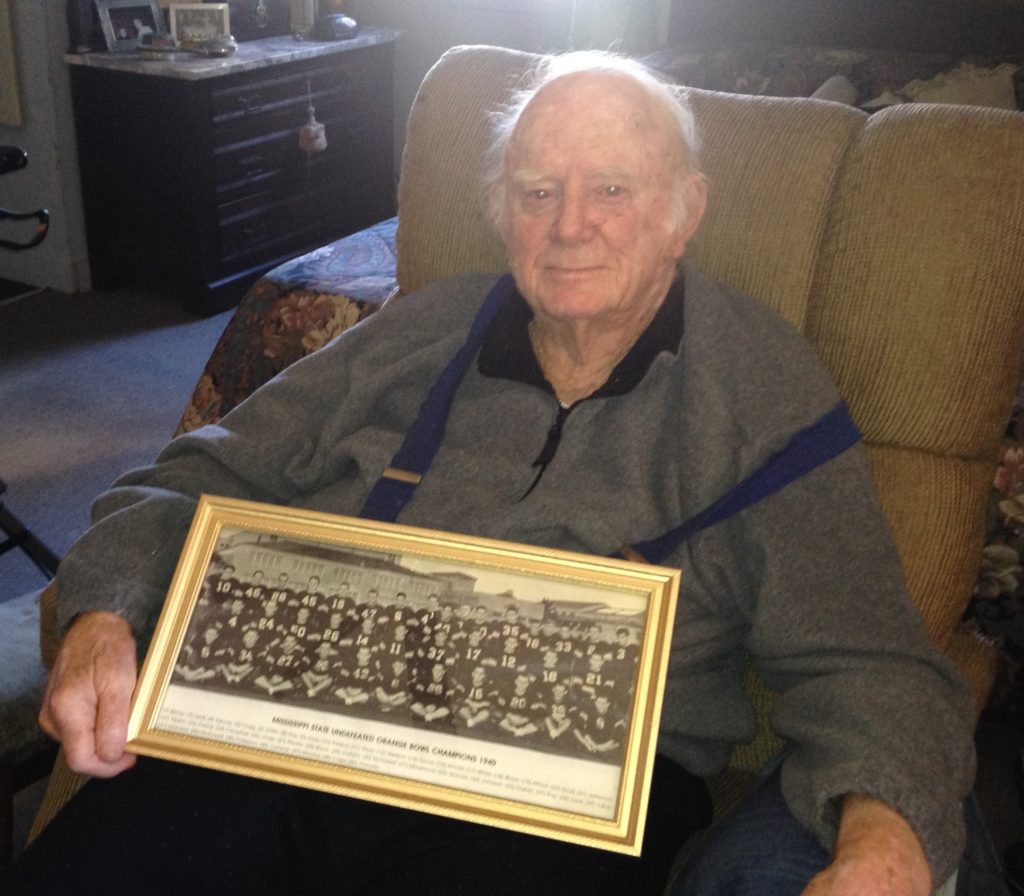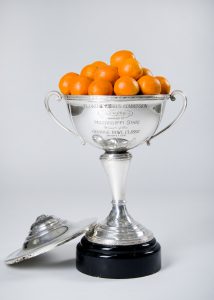State's 1941 Orange Bowl & rest of the story
Posted on: December 27,2014
(Writer’s note: What follows is my syndicated column that was published in many Mississippi newspapers and on many websites this week. At the end, you’ll find notes that didn’t make the syndicated column.)
Robert “Tut” Patterson, who turned 93 recently, remembers vividly “finally” getting off the train in Miami. He remembers the palm trees swaying in the late December breeze. He remembers the orange trees “with ripe, plump oranges.”
“You could just reach up and grab one,” Patterson says. “We all did. Pulled them right off the tree.”
“We” were the Mississippi State College Bulldogs, who on Jan. 1, 1941, defeated Georgetown University 14-7 in the Orange Bowl. The victory capped an undefeated, 10-0-1 record for the Mississippians, who had finished the regular season ranked No. 9 in the Associated Press poll.
“We took the train down there and it took us most of three days to get there,” Patterson says. “It was a long, long trip and we saw lots we had never seen before.”
No, Patterson answers, there was no celebration, no televised announcement that the Bulldogs would play in the bowl game in far-away Miami. “Coach (Allyn) McKeen just told us we were going, and that was that,” he says. “We were mighty happy to get the chance.”
Seventy-four years later, Mississippi State returns to the Orange Bowl to play Georgia Tech later this month to much pomp and circumstance. Tut Patterson will watch on the TV in his cabin, behind a daughter’s house, at the end of a gravel road in Carroll County. He is believed to be the lone surviving member of the 1940 Bulldogs who finished the season ranked No. 9 and remain the only undefeated team in Mississippi State history.
“I still watch all the games,” Patterson says. “I still pull for State.”
Dan Mullen’s 2014 Bulldogs are known as a blue-collar team, with a roster filled with two-star and three-star recruits. Seventy-four years ago, with Mississippi still mired in the Great Depression, those Bulldogs were fortunate to have a collar at all.
Patterson was a 19-year-old sophomore end from Clarksdale. Fourteen months earlier he had hitchhiked to Starkville for a tryout at age 17, hoping to earn a scholarship to play football and study farming. The coaches tried him at center first, and he failed miserably. “I was near-sighted, and I couldn’t wear my glasses playing football,” Patterson says. “I couldn’t even see who I was supposed to snap the ball to. I thought I was gonna have to hitchhike back to Clarksdale.”
Then they tried him at end. He excelled immediately and was rewarded a prized four-year scholarship.
Playing time was hard to come by at first. McKeen had assembled a talented roster of raw-boned, hungry, mostly country boys. Two years ahead of Patterson — and also playing end — was the great Buddy Elrod of Memphis, who was a first team All American that season, the first so honored in Mississippi State history.
Elrod, weighing all of 185 pounds, was the best player on a State defense that shut out four foes, including Alabama and Ole Miss, and never allowed more than 13 points in a game.
Says Patterson, “Coach McKeen believed the team that made the fewest mistakes would win. And he believed you made fewer mistakes on defense. We were a defensive team. We often kicked on third down if we were on our side of the field.”
State legend has it that nobody made a first down around Elrod’s end during his last two seasons as a Bulldog. Nickii Mosely Elrod, 94, believes the legend. She knew him well. She was “going out” with Elrod during the 1940 season when she was one of only 124 women students at A & M. From Forest, she was a cheerleader and a reporter on the campus newspaper, The Reflector. She now lives in an assisted living facility in Starkville, just a couple miles from the State campus.
She and her future husband, Buddy, weren’t dating seriously at the time, Nickii Elrod says. That came later, the next spring.
But Nickii Mosely, then 20, made that trip to Miami as a cheerleader and a reporter. She and the other cheerleaders — three guys, two women — drove in a borrowed car. She remembers the “gloriously sunny” weather, the “beautiful white sand,” and the Orange Bowl stadium “packed” with 38,300 fans.
At 94, she has not lost her sense of humor. “Of course we won,” she says, smiling. “They had us cheering for them. We had to win.”
Patterson remembers that Georgetown as “a really good team, a bunch of nice boys.”
Patterson also remembers the beach, a deep sea fishing excursion and “as much fun as a bunch of college boys are allowed to have.”
Later, Patterson would become a star end himself. He was tough, he had to be. As a junior, he suffered a broken jaw against Vanderbilt, but played the next week with the first facemask — he believes — ever worn in the SEC. He caught a touchdown pass to beat Alabama as a junior. He was team captain as a senior, All-SEC and played in the Blue-Gray all-star game.
The joy of so many football victories was short-lived for those Bulldogs. World War II changed everything about life as they knew it. Nearly all fought. Some became heroes; some died.
Elrod, married to Nickii Mosely in 1942, became a fighter pilot, shot down over Germany. He spent a year as a prisoner of war. Patterson became a paratrooper. He parachuted in behind enemy lines on D-Day. Harvey Johnson, the star halfback, was killed in action.
Only Tut Patterson and Nickii Elrod remain as participants in that first Mississippi State Orange Bowl. Yes, and 74 years later, their ancient eyes still light up when they talk about it.
•••
More notes from interview with Tut Patterson…
Patterson remains close friends with Boo Ferriss, the Mississippi baseball legend who lived across the dorm hallway from Patterson at State. Patterson says he and Ferriss survive almost all their friends because “we were the only two back then who didn’t smoke.”
Patterson says he has never touched a cigarette, primarily because of Reader’s Digest story he read about heavyweight champion Gene Tunney.
“Tunney called cigarettes ‘gaspers’ because they made you gasp,” Patterson said. “I figured if the heavyweight champion said cigarettes were bad for you, they probably were.”
•••
Patterson went on and on about Mississippi Sports Hall of Famer J.T. “Blondy” Black, who was a sophomore on that 1940 State team. This will tell you something about how good that team was: Black, a phenom, was second team.
“Blondy ran a 9.6 100-yard dash at State when the world record was 9.4 and was held by Jesse Owens,” Patterson said. “Blondy weighed 200 pounds or better and was bigger than most linemen. He would just as soon run over you as around you and he ran over his blockers if they didn’t get out of the way.
“When Blondy was a senior in high school in Philadelphia, they didn’t have a track team so he hitchhiked to the state track meet at Oxford,” Patteron continued. “He ran a 9.9 100, which was the state record and would stand for years. He also won the 220 and the long jump. Philadelphia finished third in the state meet, which meant that Blondy finished third by himself.”






